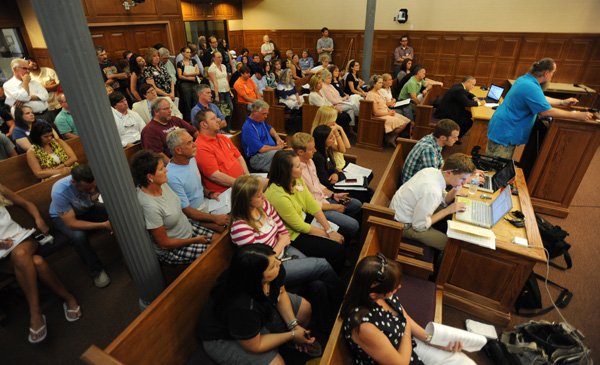FAYETTEVILLE — Fayetteville residents will be able to continue to light up inside bars that allow smoking for the foreseeable future.
Even though a majority of the City Council voted in favor of a proposal to expand Fayetteville’s smoking ordinance to include all bars in the city on Tuesday, the measure failed to garner six of eight votes needed for an expanded ordinance to go into effect early next year.
Aldermen Adella Gray, Brenda Thiel, Matthew Petty, Rhonda Adams and Sarah Lewis voted in favor of the measure, which would have modified language in an existing ordinance Fayetteville voters approved in 2004. That ordinance prohibits smoking in most workplaces with exceptions made for bars and retail tobacco outlets.
Mark Kinion, Justin Tennant and Bobby Ferrell opposed the action.
Kinion, who said Tuesday he has been involved with anti-smoking campaigns with the American Lung Association, said he fully realizes the health hazards of being exposed to secondhand smoke.
But, Kinion added, after polling Ward 2 residents and bar employees who work in smoke-filled bars, “Emphatically, all of them said, ‘I chose to work here. This is a choice for me.’”
“I don’t believe I can make a choice for these individuals,” Kinion said.
Tennant, who represents Fayetteville’s third ward, echoed Kinion’s statement.
“We cannot legislate bad decisions,” he said. “We should not try to legislate choice.”
Ward 4 Alderwoman Sarah Lewis said she also made her decision, in part, on the basis of a person’s right to choose. But, she said, given the addictive nature of cigarette smoking, she is not convinced that people are able to make rational choice on whether to light up.
“I think that, yes, there is a choice to smoke, but when the choice begins to impact others — and that’s what we have here with secondhand smoke — that’s the role of a governmental body,” Lewis said.
Tuesday’s vote came after hours of public debate and more than 40 comments from members of the public who were split nearly evenly on whether to enact or reject an expanded ordinance.
Speakers in favor of the measure outlined the well-documented health risks that accompany cigarette smoking and mentioned the need to ensure the safety and well-being of all Fayetteville residents.
Kim Agee, a Fayetteville physician who specializes in the treatment of lung diseases, said he witnesses the harmful effects of secondhand smoke on a regular basis.
Secondhand smoke is a known carcinogen that results in the death of 50,000 U.S. citizens each year, Agee said. “People who work in bars deserve to be protected from this serious health risk.”
Speaking to the notion Tuesday that an expanded ordinance would somehow put bars out of business that currently allow smoking, J.R. “Pinky” Few said, “The only business that loses money with clean indoor air is the tobacco business.”
Many of those opposed to a smoking ban in bars, focused, instead, on the belief that it should be up to bar owners whether to allow smoking in their establishments and up to bar patrons to decide whether they want to frequent a place where smoking is allowed.
Fayetteville resident Steve Frankenberger rejected the idea that an expanded smoking ordinance is primarily a public health issue.
“This is not about a right to breathe free air,” Frankenberger said. “You can breathe free air now. You have to go out of your way to find a smoking environment.”
Matt Marshall, who tends bar at Mickey Finn’s Irish Pub on Dickson Street noted that, with an ordinance in effect that prohibits smoking in most restaurants, there are drastically fewer businesses where people can consume alcohol and smoke cigarettes than places where smoking is prohibited.
Furthermore, Marshall said, “It is not essential to go (to a bar) for groceries, medicine, shopping or government functions. I think it’s within everyone’s constitution to choose whether or not they actually want to harm themselves.”
Tuesday’s vote comes about seven years after Fayetteville voters approved the city’s current ordinance and nearly three decades since the Fayetteville Board of Directors first adopted a smoking policy in 1991 that prohibited smoking in movie theaters, bowling alleys, beauty salons and several other businesses.
Had aldermen approved an expanded ordinance, Fayetteville would have joined only Fairfield Bay, a town in north-central Arkansas as the only community in the state to enact a wholesale ban on smoking in bars and restaurants.
A statewide law limits smoking, essentially, to businesses where customers must be 21 years or older to enter.
Following Tuesday’s vote, Tyler Clark, a project coordinator with the Northwest Arkansas Tobacco Free Coalition, said he was disappointed by the City Council’s decision.
“We thought we had the votes, that we had the support that we needed,” Clark said. “But we’ll be back. That’s what we do.”
City Attorney Kit Williams said following Tuesday’s meeting that, should a petition initiating an expanded smoking ordinance gain the needed signatures to go to a public referendum, that vote could not occur until at least the November 2012 general election.
Whether or not that happens, Ward 1 Alderwoman Brenda Thiel said she hoped recent discussions, if anything, would serve to educate residents about the negative effects of cigarette smoking and prevent young people from ever lighting up in the first place.
“I (felt) like this was the right thing to do,” she said.

